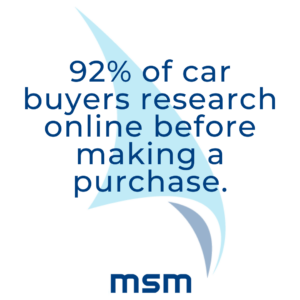Auto dealerships constantly face challenges in the ever-changing market. They must keep up with new technology and deliver exceptional customer service while trying to meet sales goals. Ultimately, an auto dealership’s success hinges on its sales team’s performance, making it crucial to attract top talent.
The Significance of Digital Media Prospecting
 With the rise of online shopping and social media, dealerships need to adapt to remain competitive. As a result, car salespeople must possess the knowledge and skills to prospect for buyers through digital media effectively, reaching their target audience.
With the rise of online shopping and social media, dealerships need to adapt to remain competitive. As a result, car salespeople must possess the knowledge and skills to prospect for buyers through digital media effectively, reaching their target audience.
According to Autotrader, car buyers spend an average of 14 hours researching online before purchasing. Consequently, salespeople must maintain a strong online presence and provide relevant information to potential customers. Additionally, they must be adept at using digital media to engage prospects and create a personalized experience that distinguishes their dealership from competitors.
To successfully prospect through digital media, salespeople must thoroughly understand digital marketing tactics, such as search engine optimization (SEO), social media marketing, and email marketing. This knowledge enables them to identify potential buyers and reach out in a personalized and relevant manner.
Remember: According to Google, 92% of car buyers research online before making a purchase.
Training and Development
Effective training enables salespeople to develop the skills and knowledge required to excel in their roles, including product knowledge, sales techniques, and customer service skills.
The National Automobile Dealers Association (NADA) reports that dealerships investing in training and development for their sales staff experience higher customer satisfaction ratings and sales volume compared to those that don’t invest in training. In fact, dealerships that invested in training saw a 20% increase in sales volume compared to those that didn’t.
To offer effective training, programs should be tailored to the sales team’s specific needs. This may include in-person training sessions, online courses, and on-the-job coaching. In addition, providing ongoing training and development opportunities helps salespeople stay current with industry trends and best practices.
Digital Marketing
Besides assisting with prospecting, digital marketing can help build brand awareness and drive traffic to the dealership’s website.
Cox Automotive states that 60% of car buyers are more likely to choose a dealership offering digital retailing options. As digital marketing dominates the business landscape, companies must adapt or risk becoming irrelevant. The global automotive e-commerce industry is projected to grow to around $176.24 billion by 2031.
To effectively leverage digital marketing, auto dealerships need a comprehensive strategy that incorporates tactics such as search engine marketing (SEM), social media advertising, and email marketing. In addition, by developing a targeted strategy tailored to the dealership’s specific audience, sales teams can increase visibility and attract more attention.
Avoid the Warm-Body Hiring Mentality
It’s essential not to simply place anyone in front of prospective buyers at an auto dealership. The warm-body syndrome hiring method revolves around staffing positions as quickly as possible, often resulting in poor staffing and talent management.
A salesforce should prioritize the quality they offer to customers. Unfortunately, the warm-body approach fails to consider cultural fit or actual talent deficiencies. To address this issue, companies must develop a recruitment strategy that proactively seeks the best fit for open positions.
Best Practices for Creating a Winning Sales Team
To ensure your sales team remains competitive in the automotive industry, follow these best practices:
1: Hire the Right People
Avoid the warm-body hiring mentality. Instead, seek individuals passionate about cars with excellent customer service skills. It’s also vital to hire tech-savvy individuals who can quickly adapt to new technologies.
2: Provide Ongoing Training
The automotive industry is continuously evolving. Therefore, ongoing training is crucial for salespeople to stay current on new technologies, market trends, and customer preferences. Regular training sessions also help salespeople develop new skills and enhance their performance, potentially leading to increased sales and customer satisfaction.
3: Set Clear Goals
Establish SMART (specific, measurable, achievable, relevant, and time-bound) goals. By setting clear goals, salespeople will understand what is expected of them and can work towards achieving these benchmarks.
4: Foster a Positive Company Culture
A supportive culture helps motivate salespeople to perform at their best and creates camaraderie among team members. Achieve this by recognizing and rewarding top performers, offering growth and development opportunities, and encouraging teamwork and collaboration.
5: Utilize Customer Relationship Management (CRM) Software
Using CRM software, salespeople can track customer preferences, follow up on leads, and provide personalized recommendations based on the customer’s needs. CRM software also assists with customer service, sales, and overall marketing efforts.
6: Embrace Digital Prospecting
According to Autotrader, car buyers spend 14 hours researching online before purchasing. Therefore, ensure your sales team is skilled in digital media prospecting to effectively reach potential customers.
7: Implement Data-Driven Decision Making
Use data from CRM software, market research, and customer feedback to guide decision-making processes. This helps in optimizing sales strategies and adapting to ever-changing market trends.
8: Invest in Recruitment Strategies
Proactively seek out top talent by developing a comprehensive recruitment strategy. This ensures a higher quality salesforce, leading to better customer experiences and increased sales.
9: Monitor and Evaluate Performance
Regularly assess sales team performance using key performance indicators (KPIs) and metrics. This allows for timely feedback, adjustments, and improvements to drive success and maintain competitiveness in the automotive industry.
10: Promote Work-Life Balance
Support a healthy work-life balance for your sales team, leading to improved job satisfaction, increased productivity, and reduced burnout, ultimately benefiting overall dealership performance.
By implementing these best practices, you can create a winning sales team capable of thriving in the competitive automotive industry.







